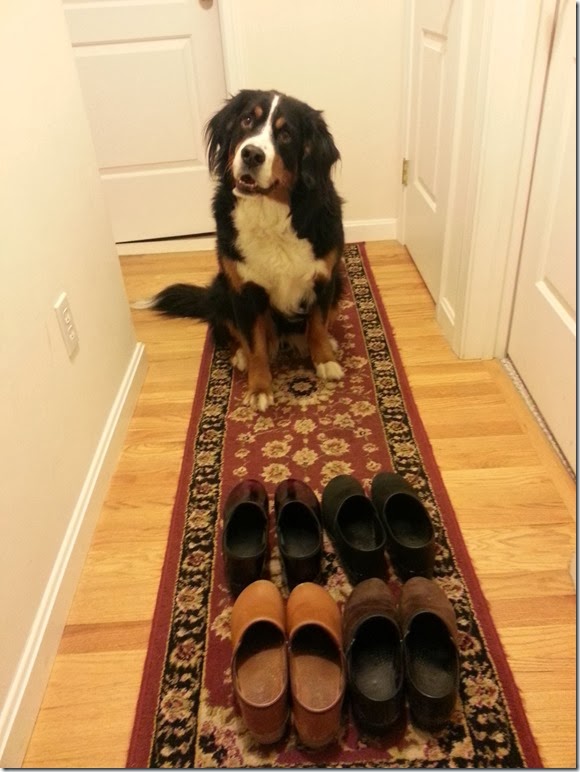In my Spanish 2 classes we are learning formal commands right now so we took advantage of dinner last night to create an activity for students to see commands in action. Anyone who has ever been fortunate enough to try Juan Carlos’ tortilla knows that it’s a special treat. So even if you don’t speak Spanish, here you can learn the secret to Juan Carlos’ tortilla española.
Friday, March 07, 2014
Wednesday, February 12, 2014
Love Ugly
I have been a teacher for a lot of years now. In movies and TV shows the female teachers are always wearing stylish clothes and dainty, beautiful shoes. Clearly television producers have no idea of the reality of teaching. Schools are fraught with corners and knobs and hooks that clothes can catch on. Schools are full of books and backpacks and lacrosse sticks that get left all over the floor and are regularly tripped over, usually by teachers trying to get somewhere fast. I have a computer that is permanently damaged since the day I tripped over a student backpack and threw it across the room. Then there is chalk, or overhead ink, or whiteboard ink, and spray cleaner and students running around with food…are you getting the picture here? School is the LAST place you wear your nice clothes, or your dainty shoes.
These are Dansko clogs, otherwise known by my students as “those ugly teacher shoes”:
You can see I am fond of them. And ugly though they may be, they are an absolute lifesaver if you have a job where you are running around all day. I can’t count the number of times they have saved me from a rolled ankle. A new pair of Danskos is a day of absolute delight. So you may think you can’t love ugly, but you’d be wrong.
Friday, January 17, 2014
What Not To Do On Sabbatical
Juan Carlos just finished a semester-long sabbatical during which he wrote a chapter of a book he is writing in collaboration with a colleague and translated a previously published article into English. Now, a sabbatical is usually considered a great thing because you can take the time to really concentrate on your work and not stress out about your teaching load, right? Well, not so much as it turns out. Here are the lessons I learned from Juan Carlos.
DO NOT:
- Spend all day every day sitting clenched in front of the computer. Especially do not do this when you are not actually writing anything.
- Keep going to school three times a week while you are on sabbatical. It’s a semester away.
- Decide that the perfect way to spend all this time is ironing the sheets and your wife’s pajamas.
- Wait until the last moment to put together the Powerpoint for your presentation, especially when you don’t really know how to use Powerpoint.
- Suddenly expect your wife to be a Mac/iPad expert when all she ever uses is PC/Android.
- Follow your wife around the house with your laptop for translating help while she is:
- cooking
- grading
-
showering, brushing her teeth ordoing anything in the bathroom. - Share with everyone the intimate details of your writing research or ask for translation help from (this includes but is not limited to): the Stake President, the car serviceman, the grocery store checkout person or your wife’s colleagues.
Anyone who knows Juan Carlos will not be surprised by any of this, but as you can see his semester away was not really a semester away. I will say that it was super nice to have all the laundry done, though. We talked about it and figured out some of the things you SHOULD do during a sabbatical. Juan Carlos managed a couple of these things, but alas, some he will be saving for next time.
DO:
- Take the dog for a walk every morning before you try to sit down and write.
- Hire an editor.
- Take a trip somewhere that is not for work. While on this trip do not think about work.
- Work for a certain period every day. If it’s not happening, go for a run or watch TV or something.
- Do laundry if it relaxes you, but leave the sheets and pajamas out of the ironing basket.
- Relax and recharge your batteries.
So as you plan for your sabbatical, keep these things in mind. And have a great one.
Wednesday, January 15, 2014
2013 and QR Codes
As I received all the Christmas and New Year's cards and accompanying letters with news of what my friends and family and all their children did in 2013, I decided I should compose one to describe what Juan Carlos and I did during 2013. Then I remembered why we don't do a Christmas letter, because every year it would look something like this:
- We already knew this, but it is now proven: Google Translate will not give you accurate translations. (Just ask the Chinese teachers)
- Where you put your clues matters. The cafeteria is not the best place.
- Remember that many students need parental permission to install apps on their phones. Plan for that.
- You can use some QR activities even if you don't have a data or internet connection.







